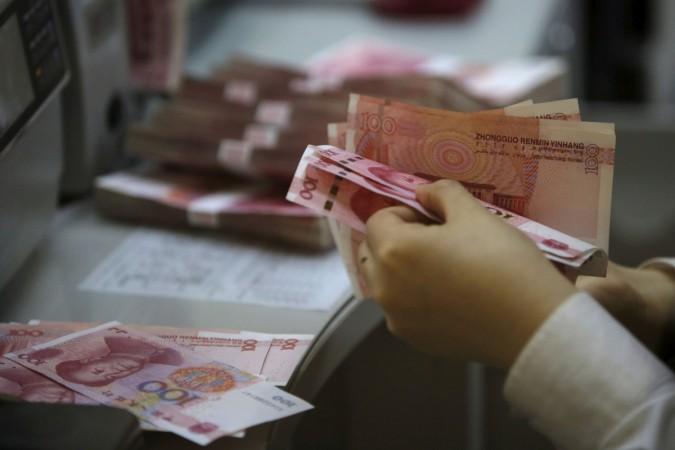
US President Donald Trump has sharpened his attack on China's unfair trade practices and warned the global export power house that attempts to undermine competition will be harshly dealt with. Trump's warning that the US will use 'all available tools' comes ahead of a deadline for imposing punitive duties on Chinese steel and aluminium.
China's 'statist' policies are causing a 'dramatic misallocation' of global resources, the President's annual report to Congress on trade policy agenda said, according to Bloomberg. "Countries that refuse to give us reciprocal treatment or who engage in other unfair trading practices will know that we know how to defend our interests," the report added. Meanwhile, New York Times reported that China dispatched President Xi Jinping's top economic adviser Liu He to the US in view of the worsening tensions.
China's manipulation of the renminbi had always remained a cause of global trade crisis but Trump's ultra-protectionist trade policies created the situation more somber in recent months. And now, the latest political developments in China have exasperated the situation.
China's embrace of Mao-era rigor, which shows through the proposed lifting of term limits for President Xi Jinping, has switched off the romantics the world over. There are many repercussions, but a trade war with the US possibly ranks as the biggest immediate result.
A looming trade war with China was the specter created by President Donald Trump during his election campaign. He had vouched for the overhaul of the free-trade agreements and imposition of 45 percent tariff on Chinese imports. However, after winning the presidency there was ambivalence in Trump's approach to China. At least he was in no hurry to take the Dragon head on.
Now, with Xi upstaging the China romantics in the west with his decision to grab power in the most blatant fashion, the guarded optimism has given way to tougher calls for action. On Monday Trump brought up the US 'trade loss' again, after the Xi announcement on Sunday. He said the US lost $504 billion in trade with China last year. The logic was flawed, as the deficit with China was technically less than that, considering the US exports to the Asian giant.
The hardening of Trump's stance on China comes ahead of the US decision on imposing tariffs on steel and aluminum imported from China. Also in April, the US will have to take a call on long-standing allegations that China was engaged in the theft of intellectual property. In a sign of how Trump White House will now deal with the age-old question of China's 'currency war', more hardline China bashers are finding their voice again in Trump's inner circle.
Intellectual property theft
The LA Times reported that Peter Navarro, who was the architect of Trump's hardline campaign-time economic rhetoric, is making a comeback. Navarro, whose books include "The Coming China Wars" and "Death by China: Confronting the Dragon — a Global Call to Action,' had been sidelined after Trump won the election and chose not to go on the offensive against China. Trump famously backtracked on a promise to name China a currency manipulator last year, citing the reason that the timing was not right.
XI Jinping's stunning bid for infinite power caused disillusionment across Washington's political spectrum. "Now that it's clear that President Xi isn't going anywhere, getting tough on China is even more of an imperative... If President Trump and Congress don't crack down on their rapacious trade practices .... China will continue eating for years to come," Democratic Senator Chuck Schumer said, according to the New York Times.
Under Trump, the image of the US as a free trade icon has suffered severe damage. Right from the starting block Trump talked about 'protecting American jobs'. He also warned China against "massive intellectual property theft, industrial subsidies and pervasive state-led economic planning". The US has always had these grouses and all presidents have come under pressure to act against China. President Obama had imposed a 35 percent tariff on Chinese tires and this resulted in China tightening restrictions on imports from the US.
In the present scenario, Trump could slap a 24 percent tariff on Chinese steel and aluminum. He could also push ahead with the investigation into China's alleged intellectual-property rights violations. The US could even brush up an old probe against China over issues of national security arising from certain imports.
All this could result in retaliation from the part of China. US soybean exports, aircraft maker Boeing, tech giants such as Apple could all bear the brunt in the process. China could also take the US to the court over violations of multilateral trade agreements.
Currency war
The US has long accused China of engaging in a currency war to help its export driven economy. China, however, maintains that it only follows competitive monetary policy, a euphemism for currency devaluation. "Although currency depreciation or devaluation is a common occurrence in the foreign exchange market, the hallmark of a currency war is the significant number of nations that may be simultaneously engaged in attempts to devalue their currency at the same time," Investopedia explains.
On February 8 the Chinese Yuan dropped 1 percent against the greenback, marking the biggest one-day fall since the central bank's Yuan devaluation in 2015. Coming as it did amid tension between the US and China on trade practices, the Yuan decline added fuel to the debate.
A weak currency helps boost a nation's exports and curb its imports. This leads to lower current account deficit, higher domestic consumption, better employment scenario, and more robust GDP growth. However, the flip side is that others also engage in the same tactics to protect their turf, which leads to an escalation. Major economies the world over engaged in competitive fiscal expansion, or quantitative easing, in the aftermath of the 2008 financial crisis, escalating the 'currency war'.

















